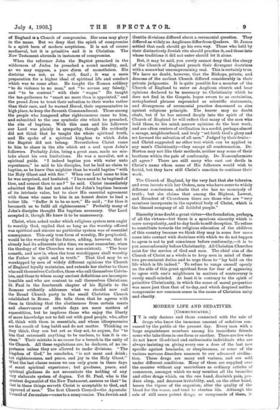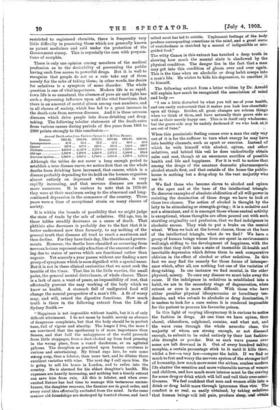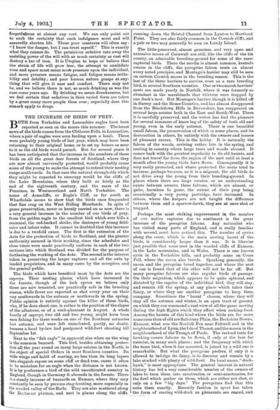I T is only doctors and those connected with the sale
of drugs who know the immense amount of sedatives con- sumed by the public at the present day. Every man with a large acquaintance numbers among his immediate friends some who take them in one form or another. There are few who do not know ill-advised and enthusiastic individuals who are always insisting on giving every one a dose of the last new specific against headache, or sleeplessness, or some of the various nervous disorders common to our advanced civilisa- tion. These drugs are many and various, and are sold under different conditions. Many of them are supplied over the counter without any restrictions as ordinary articles of commerce, amongst which we may mention all the bromides and other drugs which, on the one hand, diminish pain, pro- duce sleep, and decrease irritability, and, on the other hand, lessen the vigour of the organism, alter the quality of the blood for the worse, and tend to shorten life. Although the sale of still more potent drugs, or compounds of them, ie
restricted to registered chemists, there is frequently very little difficulty in procuring those which are generally known as patent medicines and sold under the protection of the Government stamp. This is especially the case with prepara- tions of morphia.
There is only one opinion among members of the medical profession as to the desirability of preventing the public having such free access to powerful drugs. But it is well to recognise that people do not as a rule take any of them merely for the sake of taking them; in other words, the desire for sedatives is a symptom of some disorder. The whole question is one of vital importance. Modern life is so rapid, town life is so unnatural, the absence of pure air and light has such a depressing influence upon all the vital functions, that there is an amount of mental gloom among vast numbers, and in all classes of society, which has led to a great increase in the death-rate from nervous diseases. And it is these nervous diseases which drive people into dram-drinking and drug. taking. The following tabular statement of the death-rates from various causes during periods of five years from 1861 to 1890 points strongly to this conclusion :— Annual Dealh-rates f eon Various Causes in a Million Persons.
Although the tables do not cover a long enough period to establish a true disease curve, we notice first that on the whole deaths from drinking have increased, that cancer, which is a disease probably depending for its hold on the human organism almost entirely on depressed vital conditions, is very rapilly increasing, and that nervous diseases are much more numerous. It is curious to note that in 1876-S0 they were at their maximum owing to the abnormal and long- continued depression in the commerce of the country. These years were a time of exceptional strain on many classes of society.
It is within the bounds of possibility that we might judge the state of trade by the sale of sedatives. Old age, too, in these tables steadily decreases as a cause of death. That phthisis also decreases is probably due to the fact that it is better understood now than formerly, to say nothing of the general truth that diseases all tend to reach a maximum and then decline. For they have their day, like theories and govern- ments. However, the deaths here classified as occurring from nervous lesions represent only a fraction of the amount of suffer- ing due to states of nerves which are functional rather than organic. Yet scarcely a year passes without our finding a new group of symptoms which is soon dignified with a special name. But it is not in these clinical curiosities that we must seek the trouble of the times. That lies in the little worries, the small pains, the general mental disturbance, of whole classes. There is a lack of care, a want of peace, an impossibility of rest, that effectually prevent the easy working of the body which we know as health. A stomach full of undigested food will change the mental perspective of a man's life. A fit of worry may, and will, retard the digestive functions. How much truth is there in the following extract from the Life of Sydney Smith :— "Happiness is not impossible without health, but it is of only difficult attainment. I do not mean by health merely an absence of dangerous complaints, but that the body should be in perfect tune, full of vigour and alacrity. The longer I live, the more I am convinced .that the apothecary is of more importance than Seneca, and that half the unhappiness of the world proceeds from little stoppages, from a duct choked up from food pressing in the wrong place, from a vexed duodenum, or an agitated pylorus. The deception as practised upon human creatures is curious and entertaining. My friend sups late, he eats some strong soup, then a lobster, then some tart, and he dilutes these excellent varieties with wine. The next day I call upon him. He is going to sell his house in London, and to retire into the country. He is alarmed for his eldest daughter's health. His expenses are heavily increasing, and nothing but a timely retreat can save him from ruin. All this is lobster, and when over- excited Nature has had time to manage this testaceous encum- brance, the daughter recovers, the finances are in good order, and every rural idea effectually excluded from the mind. lathe same manner old friendships are destroyed by toasted cheese, and hard
Disease. 1861-65. 1866-70. 1871-75. 1876.80. 1891.8.5. 1886-90.
Intemperance 4r6 ...
35.4 ...
37.6 ...
42.2 ...
480 ... 500 Cancer
367.8 ... 403.8 ... 445-6 ...
4952 ...
544.6 ...
599/ Phtbisis
2,526.6
2,4478 ...
2,218.0 ...
2,0400 ... 1,820•6 1,6161 Old age .......... 1,3528 ... 1,2751 ... 1,2068 ...
1,072-2 ...
1,0086 ... 974-0 Nervous system 1,5461) ... 1,605'2 ...
1,716-0 ... 1,803-6 ...
1,7976 ... 1,7851
salted meat has led to suicide. Unpleasant feelings of the body produce corresponding sensations in the mind, and a great scene of wretchedness is sketched by a morsel of indigestible or mis- guided food."
The witty Canon in this extract has touched a deep truth in showing how much the mental state is shadowed by the physical condition. The danger lies in the fact that a man may get into this condition of gloom over and over again. This is the time when an alcoholic or drug habit creeps into a man's life. He wishes to hide his depression, to smother, it to himself.
The following extract from a letter written by Dr. Arnold will explain how much he recognised the association of mind and body :— "I am a little disturbed by what you tell me of your health, and can easily understand that it makes you look less cheerfully upon all things. Besides, all great changes are solemn things when we think of them, and have naturally their grave side as well as their merely happy one. This is in itself only wholesome, but the grave side may be unduly darkened if we who look at, it are out of tune."
When this pessimistic feeling comes over a man the only way out of it is for the sufferer to turn what energy he may have into healthy channels, such as sport or exercise. Instead of which he veils himself with alcohol, opium, and other sedatives, and behind this veil he does undoubtedly obtain calm and rest, though at an enormous sacrifice of possible health and life and happiness. For it is well to notice that among the drugs of the amateur domestic pharmacopoeia alcohol stands first, and that outside of the home the public. house is nothing but a drug-shop to the vast majority who use it.
We find those who become slaves to alcohol and opium at the apex and at the base of the intellectual triangle. To discover examples of absolute abdication of all will-power in resisting the domination of these drugs we have to look at these two classes. The action of alcohol is thought by the laity to be stimulating or strength-giving ; it is a sedative and not a stimulant, and it is amongst those whose central activity is exceptional, whose thoughts are often poured out with such startling originality and profusion, that we find indulgence in alcoholic excess. They wish to put a brake on the mental wheel. When we look at the lowest classes, those at the base of the intellectual triangle, what do we find? We have a group of human beings whose lives are spent in environments well-nigh stifling to the development of happiness, with the result that they drift into a state of insensible ill-health and inevitable depression which drives them to seek comparative oblivion in the effect of alcohol or other sedatives. In this fact we may find the remedy for those forms of intemper- ance which, after all, are nothing but one of the varieties of drug-taking. In one instance we find mental, in the other physical, misery. To cure any disease we must take away the cause. If the indulgence in sedatives is established into a habit, we are in the secondary stage of degeneration, when retreat or cure is more difficult. With those who have either peculiar physical idiosyncrasies or hereditary ten- dencies, and who submit to alcoholic or drug domination, it is useless to look for a cure unless it is rendered impossible for the patient to procure his favourite poison.
In this light of varying idiosyncrasy it is curious to notice the fashion in drugs. At one time we have opium, then choral, chloroform, sulphonal, cocaine, and what not, and the wave runs through the whole neurotic class, the majority of whom are strong enough, or not diseased enough, to submit to be ruled entirely by their last fashion- able draught or powder. But as each wave passes over some are left drowned in it. Out of every hundred taking morphia, a certain percentage stick to it until it kills them, whilst a few—a very few—conquer the habit. If we find so
much to fret and worry the nervous system of the stronger half of humanity, how much more must the airless, sunless modern
life shatter the sensitive and more vulnerable nerves of women and children, and how much more intense must be the craving for some drug or drink which will lull and veil their over-sensi-
tiveness. We feel confident that men and women slide into a drink or drug habit more through ignorance than vice. The comfort is so real, so easily obtained, by taking sedatives that human beings will lull pain, produce sleep, and obtain
forgetfulness at almost any cost. We can only point out to such the certainty that such indulgence must and will assuredly shorten life. These poor creatures will often say: "I know the danger, but I can trust myself." This is exactly what they cannot do. The pernicious sedative eats away the resisting power of the will with as much certainty as rust will destroy a bar of iron. It is Utopian to hope or believe that the strain of life will grow less; the attempt to annihilate time and space must mean molt pressure upon the individual, and more pressure means fatigue, and fatigue means irrita- bility and debility; and poor human nature grasps at any- thing that will give it ease and comfort. There may not be, and we believe there is not, so much drinking as was the case some years ago. By drinking we mean drunkenness, but we feel certain that sedatives in their varied form are taken by a great many more people than ever; especially does this remark apply to drugs.












































 Previous page
Previous page